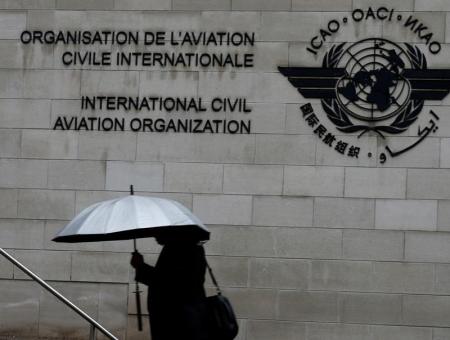Qatar Tries to Reopen Neighbors’ Skies at Special UN Hearing

2017-06-25 - 12:20 am
Bahrain Mirror - Reuters: The United Nations aviation agency will hold a special hearing next Friday on Qatar's request to reopen Gulf airspace that was closed to its flights during a major diplomatic dispute with other Arab powers, its transport minister said on Friday.
Jassim Saif Al Sulaiti told Reuters the Gulf state was pushing to "get more routes for Qatar" and wants the International Civil Aviation Organization (ICAO) to open international air routes over Gulf waters currently managed by the United Arab Emirates.
The UAE is among four countries, including Saudi Arabia, Bahrain and Egypt, that have closed their airspace to Qatar, forcing state-owned Qatar Airways to fly longer, more expensive routes.
The four Arab states that imposed a boycott on Qatar have issued an ultimatum to Doha to close Al Jazeera television, curb ties with Iran, shut a Turkish base and pay reparations. It appears compliance would be difficult with the far-reaching demands.
A decision on Friday by the Montreal-headquartered ICAO to hold the briefing next week follows concerns by Qatar Airways chief executive Akbar Al-Baker, who recently suggested the U.N agency was not working quickly enough to resolve the dispute.
By contrast, Al Sulaiti said he trusted ICAO to find a solution to the dispute, and "take action very quickly."
ICAO's 36-state governing council can act to settle the overflights row presented by Qatar, but such interventions are rare and time-consuming because the specialized UN agency usually negotiates disputes diplomatically through consensus.
ICAO cannot impose rules on states, but regulators from its 191-member countries almost always adopt and enforce its international aviation standards.
Qatar has asked ICAO to use a dispute resolution mechanism in the Chicago Convention, a 1944 treaty that created the agency and set rules for international aviation.
Article 84 says that if two states cannot resolve a dispute related to the convention through negotiation, one can ask the council to settle it, although the process is long.
It took years to resolve a dispute in the late 1990s between Cuba and the United States, which would not allow Cuban carriers to fly through U.S. airspace on the way to Canada because of Washington's economic embargo on Cuba, said Armand de Mestral, a professor emeritus of international law at McGill University.
Cuba was eventually allowed to resume flights with restrictions, a precedent that would bolster Qatar's case, he said.
- 2022-07-07Israel Reaches Record Trade Increase With Arab States Under Abraham Accords
- 2022-06-10Israeli PM Bennett Visits Abu Dhabi, Meets with UAE President
- 2022-06-10Israelis to be Allowed into Qatar for World Cup, Officials Say
- 2022-06-06Biden should not Visit Saudi, Meet Crown Prince: US Lawmaker Adam Schiff
- 2022-06-01Israel Signs UAE Free Trade Deal, Its First in Arab World